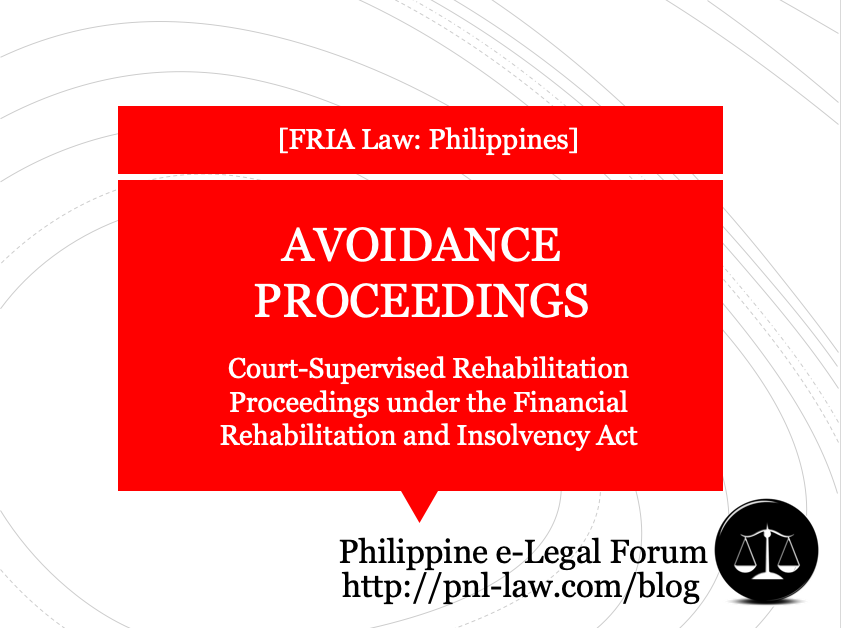Any transaction occurring prior to commencement date (the date on which the court issues the Commencement Order) entered into by the debtor or involving its funds or assets may be rescinded or declared null and void on the ground that the same was executed with intent to defraud a creditor or creditors or which constitute undue preference of creditors. This is provided in court-supervised rehabilitation proceedings [see Court-Supervised Rehabilitation] under Republic Act No. 10142, also known as the “Financial Rehabilitation and Insolvency Act (FRIA) of 2010“.

RESCISSION OR NULLITY OF CERTAIN PRE-COMMENCEMENT TRANSACTIONS
Any transaction prior to the commencement date entered into by the debtor or involving its funds or assets may be rescinded or declared null and void on the ground that it was executed with intent to defraud a creditor or creditors or that it constitutes undue preference of creditors. Without limiting the generality of the foregoing, a disputable presumption of these designs shall arise if the transaction:
- (a) provides unreasonably inadequate consideration to the debtor and is executed within 90 days prior to the commencement date;
- (b) involves an accelerated payment of a claim to a creditor within 90 days prior to the commencement date;
- (c) provides security or additional security executed within 90 days prior to the commencement date;
- (d) involves creditors, where a creditor obtained, or received the benefit of, more than its pro rata share in the assets of the debtor, executed at a time when the debtor was insolvent; or
- (e) is intended to defeat, delay or hinder the ability of the creditors to collect claims where the effect of the transaction is to put assets of the debtor beyond the reach of creditors or to otherwise prejudice the interests of creditors.
The court may rescind or declare as null and void a transaction on other grounds provided by relevant legislation and jurisprudence, including the provisions of the Civil Code on rescission.
ACTIONS FOR RESCISSION OR NULLITY
(A) The rehabilitation receiver or, with his conformity, any creditor may initiate and prosecute any action to rescind, or declare null and void any of the above-enumerated transactions.
- If the rehabilitation receiver does not consent to the filing or prosecution of such action, any creditor or the creditors’ committee may file and/or prosecute such action upon the approval of the court and after a determination that the rights of the creditors will be prejudiced if the action is not filed and/or prosecuted.
(B) If leave of court is granted under (A), the rehabilitation receiver shall assign and transfer to the creditor or the creditors’ committee all rights, title and interest in the chose in action or subject matter of the proceeding, including any document in support thereof.
- Any benefit derived from a proceeding instituted by the creditor, to the extent of his claim and the costs, belongs exclusively to him, and the surplus, if any, belongs to the estate.
Where, before an order is made under (A), the rehabilitation receiver (or liquidator) signifies to the court his readiness to institute the proceeding for the benefit of the creditors, the order shall fix the time within which he shall do so and, in that case, the benefit derived from the proceeding, if instituted within the time limits so fixed, belongs to the estate.
The action shall be filed in the court and shall be governed by the rules on summary procedure.
